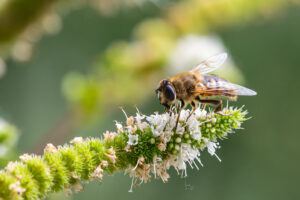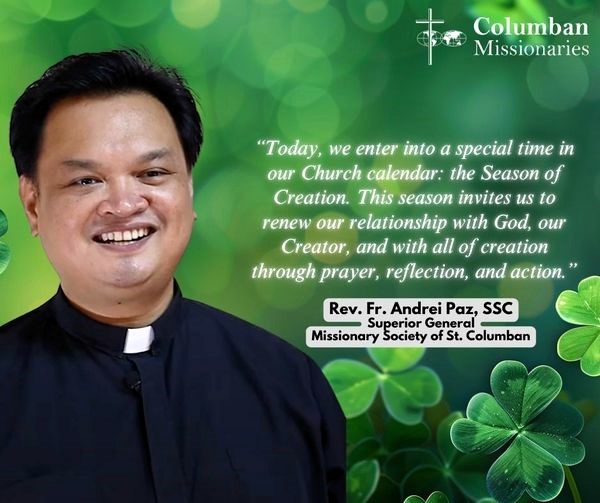The Season of Creation runs from 1st September to 4th October 2024. It is a meaningful part of the Church’s liturgical calendar, encouraging Christians to reflect on their connections with God, people, and the environment.
This year’s theme, ‘To hope and act with Creation,’ invites active engagement rather than passive waiting, drawing inspiration from the biblical image of Earth as a nurturing mother.
During this period, Christians are called to use their gifts and talents to address ecological needs, recognizing that true hope is deeply rooted in the Creator’s plans.
Columban missionaries, who work in solidarity with impoverished communities, emphasise the importance of ecological integrity and justice, noting that environmental harms disproportionately affect the poorest.
The Laudato Si’ goals, introduced in 2021, offer practical steps for personal and communal transformation, including responses to environmental and social crises.
Engaging in activities such as responsible consumption, land restoration, and community storytelling can contribute to the common good and the ongoing creativity of the Creator’s plan.
Please read Society Leader, Fr Andrei Paz’s Season of Creation Homily
Today, we enter into a special time in our Church calendar: the Season of Creation. This season invites us to renew our relationship with God, our Creator, and with all of creation through prayer, reflection, and action. Our theme this year, “Hope and Act with Creation,” is particularly relevant to us here in Malate, where the effects of ecological destruction are part of our daily lives.
And today’s readings offer us guidance on how our faith can help us respond to the environmental challenges we face. They remind us that our relationship with God is deeply connected to how we care for the world around us. We heard the story of Moses urging the Israelites to follow God’s commandments as they prepare to enter the Promised Land. These commandments were not just rules, but a way of living that would bring them into harmony with God, with each other, and with the land they were about to receive.
Here in Manila, we too are called to live in harmony with God’s creation. But we know that our city faces many environmental problems: polluted air and water, the loss of green spaces, reclamation of Manila Bay and the impacts of climate change, like flooding and typhoons. These issues are not just physical problems; they are signs that we have strayed from God’s ways. We have not always cared for the Earth as we should. But just as Moses reminded the Israelites, there is still hope. If we return to God’s commandments and choose to live justly and sustainably, we can begin to heal our relationship with the Earth and with each other.
St. James reminds us that “every good gift and every perfect gift is from above.” The natural world: the trees, the rivers, the air we breathe, is a gift from God. It is a sign of his goodness and his love for us. But St. James also tells us that it’s not enough to just hear God’s word; we must live it out in our actions. Our faith must be visible in how we care for those who are most in need.
We see how environmental problems affect the poor and vulnerable the most. Many of our brothers and sisters live in areas where they are exposed to pollution, flooding, and the health risks that come with these conditions. As Christians, we are called to stand with them, to work for justice, and to protect the environment for everyone, not just for a few. This is what it means to “hope and act with creation.” It means recognizing that our faith compels us to care for the Earth and all its inhabitants, and to take concrete steps to do so.
And then in the Gospel, Jesus challenges the Pharisees and scribes who focus on external rituals instead of inner transformation. He tells them that what really matters is not what’s on the outside, but what’s inside: our thoughts, our intentions, our love for God and for others. This teaching is crucial for us as we think about our environment. Caring for creation is not just about outward actions; it requires a change of heart. And so, we need to ask ourselves if we are living in a way that honours God’s creation, or if we are contributing to its destruction.
This change of heart is what Pope Francis calls “ecological conversion” in his encyclical Laudato Si’. It’s about understanding that our relationship with the Earth is not just an environmental issue, but a moral and spiritual one. It’s connected to how we relate to God, to each other, and to the world around us. Ecological conversion calls us to live in a way that is simpler, more sustainable, and more in tune with the rhythms of creation.
So, how do we respond to this call to “hope and act with creation,” especially when we live in a place where environmental problems are so evident? Let us remember P-E-R-A.
First, we begin with prayer. Prayer is a powerful tool that opens our hearts to God’s presence in all things, including the natural world. It helps us to see creation as a gift from God and to develop a sense of gratitude and responsibility. During this Season of Creation, let us take time to pray for those who are most affected by environmental problems, and for the courage to change our own lives in ways that contribute to the well-being of the Earth.
Second, we need to educate ourselves and each other about the environmental issues we face. Understanding the causes of pollution, the effects of climate change, and the importance of protecting our natural resources, helps us to make better decisions and to take meaningful actions. It also helps us to see that caring for creation is also about caring for our neighbours, especially those who are most vulnerable.

Image: Shutterstock
Third, we can take practical steps in our daily lives to reduce our impact on the environment. This might mean reducing waste, conserving water and energy, supporting local and sustainable products, and participating in community clean-up efforts. These actions, however small, are important expressions of our commitment to care for the Earth. They are ways in which we can live out our faith in tangible, practical ways.
Finally, we must work together to advocate for bigger changes. Individual efforts are important, but they are not enough to address the scale of the environmental problems we face. We need to come together as a community to demand justice for our environment, to stand up against the forces that are destroying our land and water, and to advocate for policies that protect our natural resources for everyone.
As we enter this Season of Creation, let us remember the words of St. Paul in his Letter to the Romans: “The creation waits in eager expectation for the children of God to be revealed.” Our world is hurting because of our sins, but it also holds hope; hope that we, as God’s children, will step up and fulfil our role as caretakers of the Earth.
Let us not let this hope fade away. Let us take on our role as caretakers of creation with courage and determination. Let us place our hope in God’s promise of renewal, and act with love and responsibility towards the world he has given us. And as we do, may we draw closer to God who is the source of all life and who makes all things new.
As we take on this journey of ecological conversion, may we, as a parish, be a light of hope for all creation.

